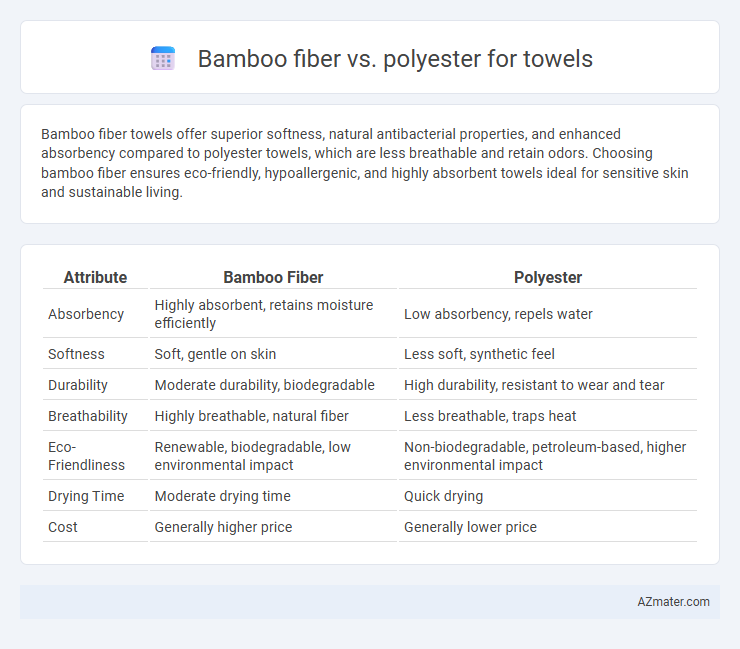Bamboo fiber towels offer superior softness, natural antibacterial properties, and enhanced absorbency compared to polyester towels, which are less breathable and retain odors. Choosing bamboo fiber ensures eco-friendly, hypoallergenic, and highly absorbent towels ideal for sensitive skin and sustainable living.
Table of Comparison
| Attribute | Bamboo Fiber | Polyester |
|---|---|---|
| Absorbency | Highly absorbent, retains moisture efficiently | Low absorbency, repels water |
| Softness | Soft, gentle on skin | Less soft, synthetic feel |
| Durability | Moderate durability, biodegradable | High durability, resistant to wear and tear |
| Breathability | Highly breathable, natural fiber | Less breathable, traps heat |
| Eco-Friendliness | Renewable, biodegradable, low environmental impact | Non-biodegradable, petroleum-based, higher environmental impact |
| Drying Time | Moderate drying time | Quick drying |
| Cost | Generally higher price | Generally lower price |
Introduction to Bamboo Fiber and Polyester Towels
Bamboo fiber towels are derived from bamboo pulp, offering natural antibacterial properties, high absorbency, and eco-friendly biodegradability, making them a sustainable alternative to traditional fibers. Polyester towels, typically made from synthetic polymers, provide durability, quick-drying features, and resistance to shrinking, but lack biodegradability and are less environmentally friendly. The choice between bamboo fiber and polyester towels depends on priorities such as sustainability, softness, moisture absorption, and long-term usage.
Material Composition: Bamboo Fiber vs Polyester
Bamboo fiber towels are made from natural cellulose fibers derived from bamboo plants, offering hypoallergenic, antimicrobial, and biodegradable properties ideal for sensitive skin and eco-conscious consumers. Polyester towels consist of synthetic polymers derived from petroleum, providing high durability, quick-drying capabilities, and resistance to shrinking and wrinkles but lack breathability and biodegradability. The material composition significantly impacts absorbency, softness, environmental footprint, and overall comfort in towel usage.
Absorbency Comparison: Which Is Better for Towels?
Bamboo fiber towels exhibit superior absorbency due to their micro-gaps and natural hygroscopic properties, allowing them to soak up water quickly and retain moisture effectively. Polyester towels, made from synthetic fibers, typically have low absorbency and tend to repel water rather than absorb it, making them less ideal for drying purposes. For superior absorbency and a more natural feel, bamboo fiber towels outperform polyester towels in moisture retention and comfort.
Softness and Comfort: Experience Differences
Bamboo fiber towels offer exceptional softness and breathability due to their natural micro-gaps, making them highly absorbent and gentle on the skin. Polyester towels are typically less soft and can feel rougher as synthetic fibers trap heat and moisture, reducing overall comfort. Choosing bamboo fiber enhances comfort with its hypoallergenic and moisture-wicking properties, ideal for sensitive skin and maintaining freshness.
Durability and Longevity of Each Towel Type
Bamboo fiber towels offer natural antibacterial properties and moderate durability, making them resistant to wear over time but somewhat prone to pilling with frequent washing. Polyester towels exhibit superior durability and excellent longevity due to their synthetic composition, maintaining shape and color after extensive use and repeated laundering. While polyester is more resilient against abrasion, bamboo fiber towels provide eco-friendly softness with a shorter lifespan in comparison.
Environmental Impact: Sustainability and Eco-Friendliness
Bamboo fiber towels offer superior sustainability compared to polyester, as bamboo is a fast-growing, renewable resource that requires minimal water and no pesticides, reducing environmental strain. In contrast, polyester is derived from non-renewable petroleum, contributing to greenhouse gas emissions and microplastic pollution during washing. Bamboo towels are biodegradable, breaking down naturally without harming ecosystems, whereas polyester towels persist in landfills and oceans, posing long-term ecological risks.
Drying Time: Fast-Drying Capabilities
Bamboo fiber towels exhibit superior fast-drying capabilities compared to polyester due to their natural moisture-wicking and breathable properties, which facilitate quicker evaporation. Polyester fibers tend to retain moisture longer, resulting in slower drying times and potential odor retention. Choosing bamboo fiber towels enhances drying efficiency and hygiene, making them ideal for frequent use and travel.
Anti-Bacterial and Hypoallergenic Properties
Bamboo fiber towels exhibit superior anti-bacterial properties due to the presence of natural bio-agents like bamboo kun, which inhibits bacterial growth more effectively than polyester. Hypoallergenic qualities in bamboo fiber reduce the risk of skin irritation and allergic reactions, making it ideal for sensitive skin compared to polyester, which can trap allergens and irritants. Bamboo towels also offer enhanced moisture-wicking and breathability, contributing further to a cleaner, softer, and more skin-friendly drying experience.
Care and Maintenance Requirements
Bamboo fiber towels require gentle washing in cold water with mild detergent to preserve their natural softness and antimicrobial properties, avoiding bleach and fabric softeners that can degrade fibers. Polyester towels, on the other hand, tolerate higher washing temperatures and are more resistant to shrinking and wrinkling but may retain odors if not properly dried. Both materials benefit from air drying or low heat tumble drying to maintain longevity and absorbency.
Price and Value for Money
Bamboo fiber towels typically cost more upfront than polyester towels due to their natural origin and eco-friendly production process. Despite the higher price, bamboo fiber towels offer superior absorbency, softness, and antimicrobial properties, providing enhanced comfort and durability that justify the investment over time. Polyester towels, while cheaper and quick-drying, often lack breathability and longevity, making bamboo fiber a better value for money for those prioritizing quality and sustainability.

Infographic: Bamboo fiber vs Polyester for Towel
 azmater.com
azmater.com